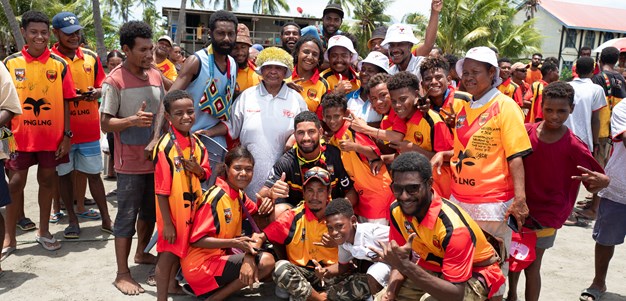Parramatta and North Queensland go head to head tonight in a match that – in the Eels’ case at least – will very much define their season. Yet it is off the field that the greatest saga is set to play out.<br><br>Rival coaches Daniel Anderson and Neil Henry are under as much pressure as their misfiring players this season, with the Parramatta board reportedly fractured over Anderson’s future while Henry is almost certain to miss the finals for the second time in as many years with the Cowboys.<br><br>But is the expectation too great? And how long should an NRL coach be given before the knives can justifiably be sharpened?<br><br>Former Cronulla coach Stuart Raper, who spent three seasons with the Sharks between 2004-06 before being replaced by Ricky Stuart, is adamant that no head coach should be judged until at least three years into his tenure.<br><br>“I think you need three years – it always amazes me when a coach is given two years and told to go out and fix things,” Raper told NRL.com.<br><br>“Usually when a coach takes on a new job it’s on the back of the former coach being let go or axed, so generally the club hasn’t been that successful… but although you have different styles of coaching (to the predecessor) and you want different blokes, unfortunately you’ve still got contracts that are overlaying into your term. <br><br>“It’s going to take a year or two just to bring in the players that suit your way, or that you think will suit the other players. <br><br>“I always find going to a new club that you often have a bit of immediate success because the impact is there – it’s a new voice and training is different – but it takes a few more years to really get things going the way you want them.”<br><br>Henry’s predecessor, Graham Murray, agrees. Murray spent seven years at the Cowboys between 2002-08 and believes clubs in the current climate expect too much, too soon.<br><br>“You’ve got to be patient,” he said. “Obviously you’ve been given a job to coach a football team so you’ve got to apply your philosophies but you have to do that with the people you’ve been given. <br><br>“That’s always going to take time but unfortunately you don’t often get five years to turn them all over. I think you need three years to prove yourself.”<br><br>Murray said that setting basic expectations at a new club was the first step for an incoming coach but introducing new players and a new style of play wasn’t so simple. <br><br>“You’ve got to take it pretty slowly,” he said. “In regards to setting standards such as being on time and being in uniform, I used to make that mandatory in my first speech. <br><br>“If people could do that I was confident I could coach them into football – but you’ve got to drip-feed that side of things.”<br><br>Former Newcastle and Parramatta coach Michael Hagan said that the nature of the modern game meant that incoming coaches could realistically expect no more than a two-year window to show results, although he admitted: “That’s probably not fair.<br><br>“You take an example of Daniel Mortimer jumping out of the ground last year and the club having to let people go to keep him,” he said.<br><br>“These are the things that you have to make judgment calls on all the time and on the run – and you’re not always going to get it right.”<br><br>Hagan said it was particularly difficult at big clubs like Parramatta where expectation was always high – despite the Eels cutting spending considerably since Anderson’s arrival last season.<br><br>“Even when I had agreed to leave, they had decided to take $500,000 out of the budget in respect to the football department, junior development and the coaching department,” he said.<br><br>More importantly, according to Stuart Raper, is the understanding that bringing in a new head coach doesn’t necessarily signal a significant change at a club.<br><br>That’s why Sharks assistant Shane Flanagan has been give only one year to prove himself once he takes over from head coach Ricky Stuart in 2011.<br><br>“It’s different when an assistant coach takes over because he has been a part of it and would have had some sort of say in recruitment and players,” Raper said. “If you really want to change things around and go in a new direction then you need to change the entire coaching staff. <br><br>“A coach is one influential part of the system and he is the part that the public sees but your assistant coaches, your trainers, your physios and your conditioners – they’re with the players more than the head coach is. <br><br>“They’re with them every single day and they talk to the players far more than you do. So they can be very influential in the environment that you have. <br><br>“If you’re going to change things you need to change the whole structure of the club.”<br><br>Raper said he felt for the current group of NRL coaches experiencing the pressures of expectation – particularly Anderson after he guided the Eels to the 2009 grand final in his first season.<br><br>“Unfortunately board members do tend to panic a little bit,” Raper said. “They’re under pressure from sponsors and supporters – it’s unfortunate that they can’t stay a bit stronger. <br><br>“He has made it to two grand finals so it’s obvious that he can coach and that he has the abilities to do it. <br><br>“You need to stick solid a little bit, I think.”<br>
You have skipped the navigation, tab for page content

National Rugby League respects and honours the Traditional Custodians of the land and pay our respects to their Elders past, present and future. We acknowledge the stories, traditions and living cultures of Aboriginal and Torres Strait Islander peoples on the lands we meet, gather and play on.
